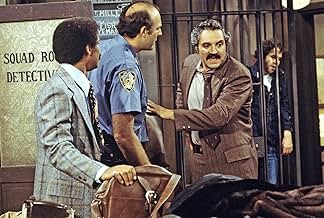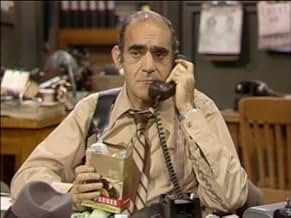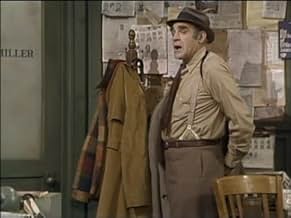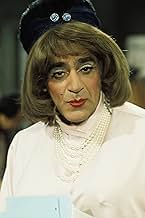Il capitano del dodicesimo distretto di polizia di New York e il suo staff gestiscono i vari problemi e i personaggi locali che entrano nei locali della squadra.Il capitano del dodicesimo distretto di polizia di New York e il suo staff gestiscono i vari problemi e i personaggi locali che entrano nei locali della squadra.Il capitano del dodicesimo distretto di polizia di New York e il suo staff gestiscono i vari problemi e i personaggi locali che entrano nei locali della squadra.
- Vincitore di 3 Primetime Emmy
- 9 vittorie e 43 candidature totali
Sfoglia gli episodi
Recensioni in evidenza
This show was one of the reasons why the ABC would dethrone the CBS, as the number one network in prime time in the latter 1970's.
Barney Miller depicted the day to day workings of a typical New York City detectives unit. Void of overly melodramatic urban drama, and the now all too over played "tough guy" act, Barney Miller was touted as being a fair portrayal of the life of a detective (with much more levity of-course).
Even though it was first and foremost a comedy series, the writers gave us a much needed balance by injecting a bit of drama into the plot and characters themselves. This dramatic element was so well done, that it added to character development, and provided for more laughter. Their witty dialog rarely left the viewer disappointed, or without a laugh, and with entertainment being the key factor of any Television production, the cast of Barney Miller delivered in episode after episode.
However, the show was produced during a time when crime in NY City was being managed with a overly diplomatic approach. An experiment that would prove it self to be disastrous, effectuated lectures by some of the shows characters, demonstrating an endorsement of this new more "liberal" approach to fighting crime.
There is not much out there today that even comes close to what we had in Barney Miller. It seems that todays Television lacks respect for their audience, as cheap sexual gags, and one liners dominate the sitcom landscape, and leave us with vacuous and cloddish jocularity.
Barney Miller will however, be an example of what Television once was. A time when mature, plot driven humor was demanded, and the crude and immature was rejected.
Barney Miller depicted the day to day workings of a typical New York City detectives unit. Void of overly melodramatic urban drama, and the now all too over played "tough guy" act, Barney Miller was touted as being a fair portrayal of the life of a detective (with much more levity of-course).
Even though it was first and foremost a comedy series, the writers gave us a much needed balance by injecting a bit of drama into the plot and characters themselves. This dramatic element was so well done, that it added to character development, and provided for more laughter. Their witty dialog rarely left the viewer disappointed, or without a laugh, and with entertainment being the key factor of any Television production, the cast of Barney Miller delivered in episode after episode.
However, the show was produced during a time when crime in NY City was being managed with a overly diplomatic approach. An experiment that would prove it self to be disastrous, effectuated lectures by some of the shows characters, demonstrating an endorsement of this new more "liberal" approach to fighting crime.
There is not much out there today that even comes close to what we had in Barney Miller. It seems that todays Television lacks respect for their audience, as cheap sexual gags, and one liners dominate the sitcom landscape, and leave us with vacuous and cloddish jocularity.
Barney Miller will however, be an example of what Television once was. A time when mature, plot driven humor was demanded, and the crude and immature was rejected.
This show was one of the funniest in the history of television. The various characters that came in and out of the station made this show what it was. I really think the show was at its peak during the period when Abe Vigoda, Jack Soo and Steve Landesberg were all on the show together. However, once Vigoda and Soo were gone, the show seemed to shift to a more dramatic direction. This was especially evident in the memorial episode for Jack Soo. However, this was a highly influential show and if you look at Night Court, which was produced by pretty much the same team as this one, you will see some of the same qualities on that show that made this one great.
Of the thousands of American TV sitcoms ever produced, only a small portion of them are genuinely enjoyable and funny 40 years after their production. Barney Miller is one of those shows. More interesting than this fact, however, is that this show has many features atypical of its genre and time period:
1. Virtually all of the action (excepting a handful of scenes and the strange and mostly unenjoyable 'Wojo's Girl' 2-parter) takes place at a single location, the police station. In this way, the show is like a stage play, and of course, stunningly similar to the classic Kirk Douglas play & film 'Detective Story.'
2. There is almost no slapstick, no catchphrases, and no toilet humor.
3. Unlike the most popular sitcoms of the mid-1970's, such as 'All In the Family', 'Good Times', etc. none of the recurring cast play their characters broadly. None of them are shouting tyrants, cartoonish buffoons, dingy housewives, etc. Most of the regular cast played their characters toward the deadpan end of the comedic spectrum. (The recurring Inspector Luger, played by the great James Gregory, is gently buffoonish, but nothing like Ted Baxter or George Jefferson.) One episode is an exception to this rule, 'The Brownies,' which is one of the 10 funniest sitcom episodes ever produced. If you have seen this episode, you know why the characters were played differently this time around, and you know that the essence of the story is seeing the characters behaving different than usual.
4. With the exception of Barbara Barrie as the intermittent presence of the titular character's wife in the early episodes, there are no recurring female characters. (Just an observation, not saying this is a good thing for every sitcom.)
These facts argue in favor of the theory that artists who seek to create something of quality and durability should not always try to imitate. Doing something different can be good.
The writing and the performances are the essence of why this show is good. But also there is the faded paint and rumpled clothes, and the varying degrees of world-weariness in faces of Yamana, Fish, Capt. Miller, and Inspector Luger, which evoke the gritty, working class realities of old New York before a series of quasi-fascist mayors tried to reboot the city as a kind of fantasyland for rich people and tourists.
A final point of interest to which I will draw your attention is gentle and matter-of-fact way in which the cops interact with both 'criminals' and 'victims.' You won't see them trying to intimidate or torture criminals into confessions. There is an implicit message of compassion in this, along with the related notion that when the total circumstances of life are taken into account, the moral differences between people don't seem all that huge.
1. Virtually all of the action (excepting a handful of scenes and the strange and mostly unenjoyable 'Wojo's Girl' 2-parter) takes place at a single location, the police station. In this way, the show is like a stage play, and of course, stunningly similar to the classic Kirk Douglas play & film 'Detective Story.'
2. There is almost no slapstick, no catchphrases, and no toilet humor.
3. Unlike the most popular sitcoms of the mid-1970's, such as 'All In the Family', 'Good Times', etc. none of the recurring cast play their characters broadly. None of them are shouting tyrants, cartoonish buffoons, dingy housewives, etc. Most of the regular cast played their characters toward the deadpan end of the comedic spectrum. (The recurring Inspector Luger, played by the great James Gregory, is gently buffoonish, but nothing like Ted Baxter or George Jefferson.) One episode is an exception to this rule, 'The Brownies,' which is one of the 10 funniest sitcom episodes ever produced. If you have seen this episode, you know why the characters were played differently this time around, and you know that the essence of the story is seeing the characters behaving different than usual.
4. With the exception of Barbara Barrie as the intermittent presence of the titular character's wife in the early episodes, there are no recurring female characters. (Just an observation, not saying this is a good thing for every sitcom.)
These facts argue in favor of the theory that artists who seek to create something of quality and durability should not always try to imitate. Doing something different can be good.
The writing and the performances are the essence of why this show is good. But also there is the faded paint and rumpled clothes, and the varying degrees of world-weariness in faces of Yamana, Fish, Capt. Miller, and Inspector Luger, which evoke the gritty, working class realities of old New York before a series of quasi-fascist mayors tried to reboot the city as a kind of fantasyland for rich people and tourists.
A final point of interest to which I will draw your attention is gentle and matter-of-fact way in which the cops interact with both 'criminals' and 'victims.' You won't see them trying to intimidate or torture criminals into confessions. There is an implicit message of compassion in this, along with the related notion that when the total circumstances of life are taken into account, the moral differences between people don't seem all that huge.
How come there are not more TV shows like Barny Miller? This was one of the best TV shows on TV. The writing and characters were fantastic and even though it has a 1970's feel and look to it, the show still packs a punch.
Barney Miller dealt with important topics as gay police officers and the fact that even though they are gay, they are still valuable members of society.
There are not really and funny shows anymore. What is a TV viewer suppose to watch? Friends?? Paris Hilton washing a cow. Please give me something!!!
Barney Miller dealt with important topics as gay police officers and the fact that even though they are gay, they are still valuable members of society.
There are not really and funny shows anymore. What is a TV viewer suppose to watch? Friends?? Paris Hilton washing a cow. Please give me something!!!
This is one of the absolute greatest shows on television - never fails to entertain. Too bad the "suits" didn't catch on and try to copy what so obviously worked. It ranks right there with M*A*S*H, Frasier, Cheers, and Married...With Children as examples of how good comedy can be...
Lo sapevi?
- QuizDuring its broadcast run, amid the many cop shows on television at the time, many real-life police officers considered this the show that best depicted the realities of police life.
- BlooperDetective Fish has inconsistent years of service with the department. In the season one episode "The Arsonist " he mentions being on the force for 25 years. In the same seasons episode "Fish" he remarks that he went to the academy in 1937, making him a 38 year veteran.
- Citazioni
Yemana: Then Fish runs in the alley and he leaps over us like one of those, what do you call those things in Africa that run and leap in the air?
Detective Ron Harris: Slaves.
- Curiosità sui creditiAt different times in the production of the series Max Gail was credited as both Max Gail and Maxwell Gail.
- ConnessioniFeatured in The 28th Annual Primetime Emmy Awards (1976)
I più visti
Accedi per valutare e creare un elenco di titoli salvati per ottenere consigli personalizzati
- How many seasons does Barney Miller have?Powered by Alexa
Dettagli
- Data di uscita
- Paese di origine
- Lingua
- Celebre anche come
- The Life and Times of Captain Barney Miller
- Luoghi delle riprese
- Azienda produttrice
- Vedi altri crediti dell’azienda su IMDbPro
- Tempo di esecuzione30 minuti
- Colore
Contribuisci a questa pagina
Suggerisci una modifica o aggiungi i contenuti mancanti









































